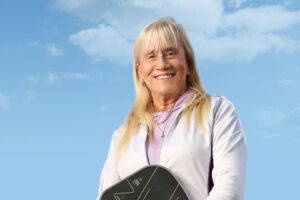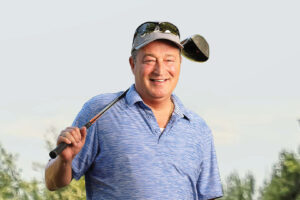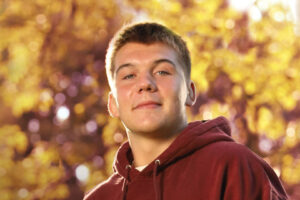Rutgers University wrestling coach Jordan Pagano, 27, was recently demonstrating simple wrestling moves with a student-athlete, something he does regularly. When he placed his hands on the mat to change positions, the unexpected happened: he ruptured a disc in his neck. The herniated disc pushed on Jordan’s spinal cord, paralyzing him instantly.
“I felt two jolts of electricity run down my neck to my toes,” explains the New Brunswick resident. “My body just went limp. I couldn’t feel anything. It was terrifying.”
An athletic trainer at the university stabilized Jordan’s neck before he was taken to an area emergency department. He regained sensation on the left side of his body but was still numb on the right side. The first doctor he saw recommended emergency surgery, but Jordan wanted a second opinion. His father called CentraState neurosurgeon Mark McLaughlin, MD, who reviewed Jordan’s imaging tests late that night and urged Jordan to come to his office when he was discharged the following day.
“I didn’t see a fracture, but the damaged disc was putting significant pressure on his spinal cord,” explains Dr. McLaughlin, who wrestled in college and now coaches youth wrestling through a nonprofit organization he founded.
“After talking with Dr. McLaughlin, I knew he was the right doctor for me,” says Jordan, who had regained most of the feeling in his body and was able to walk into the surgeon’s office with some assistance. “We connected over our shared love of wrestling and passion for teaching the sport. He made me feel calm about having surgery.”
The First Move to Get Back on the Mat
To repair Jordan’s spine, Dr. McLaughlin performed a procedure called anterior cervical discectomy and fusion (ACDF). During surgery, he removed the damaged disc, replaced it with a spacer and affixed a metal plate to help stabilize the joint.
“We repaired Jordan’s spine quickly and effectively, a testament to our whole surgical team,” says Dr. McLaughlin.
About two weeks after surgery, Jordan was cleared for rehabilitation. Over the next few months, he slowly increased his workouts, eventually adding weights to his routine. Now nearly fully recovered, he’s looking forward to getting back on the mat.
“Dr. McLaughlin is a wizard,” says Jordan. “I’m thankful that I chose to get a second opinion.”
“It was an honor to care for Jordan,” Dr. McLaughlin says of their bond. “He’s a terrific young man with an amazing future in front of him.”
Neurology Services at CentraState
To learn more, visit our neuroscience services page.





